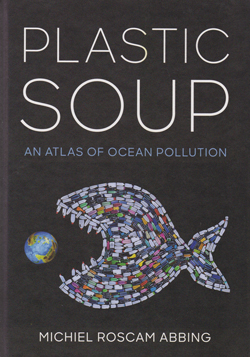
The potential usefulness of plastics (synthetic materials derived from petrochemicals) was first shown over 150 years ago, when Alexander Parkes demonstrated Parkesine—an organic plastic made from cellulose that, when heated, becomes malleable—at the 1862 Great International Exhibition, London. In
Plastic Soup, Abbing documents how plastics have since come to dominate our lives, their properties (lightweight, easily moulded, strong, waterproof) being revolutionary. In this lavishly but disturbingly illustrated book, topics ranging from plastic production (“Plastic Fantastic”), through pollution, to legislative means of combatting challenges associated with plastics (“Turning The Tide”) are each described in two pages of text and pictures. The evenly-handed text documents both the benefits and problems (especially in the oceans) associated with plastics. Abbing notes how they barely react with other substances, giving myriad applications. Many traditional substances (glass, wool, cotton, earthenware, metals) have been replaced with plastics. At first glance, this has environmental benefits. Plastic production, for example, releases less greenhouse gases, and uses less water and energy, than does paper manufacture. Plastic-wrapped foods have longer shelf lives, while plastic-wrapped goods (recall the fun-filled bubble wrap) are protected during transport.
There are two classes of plastics: Thermosets like Bakelite become hard on cooling and are used in rigid products (e.g. electrical plugs, aircraft), while Thermoplastics like polyethylene (polythene) soften when heated and have the potential to be melted and re-shaped many times. However, the ease of plastics production and their low cost has led to many plastic products being seen as disposable, single-use items. Abbing tells us that 2.5 million plastic bottles are thrown away hourly in the USA alone, where each person disposes of about 85 kg of plastic annually. On average, a plastic bag is used for just 12 minutes.
While plastics barely react chemically with other substances, once in the wider environment they are broken physically into ever smaller pieces, ranging down to nanoplastics < 0.1 µm in size. The 3% of plastic delivered to the seas has now formed a plastic soup so dense that there is an ocean-wide plastisphere. This is ingested by some organisms, traps others, smothers some shorelines, and provides a habitat for potentially toxic bacteria—factors that this reviewer notes to render challenging the geoscientists’ practice of using the present as the key to the past.
One wonders, how can geoscientists contribute their skills to combatting the problems from plastics? I recommend this book to those concerned about this issue, that they might help identify solutions.
Reviewed by Brent Wilson
PLASTIC SOUP: AN ATLAS OF OCEAN POLLUTION by Michiel Roscam Abbing, 2019. Published (and translated from Dutch into English) by: Island Press, Center for Resource Economics, Washington, D.C., USA, 144 pp. ISBN-10: 1642830089, ISBN-13: 978-1642830088
List Price: £20.00
W: https://islandpress.org/books/plastic-soup